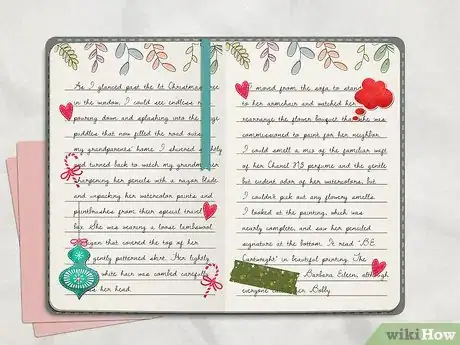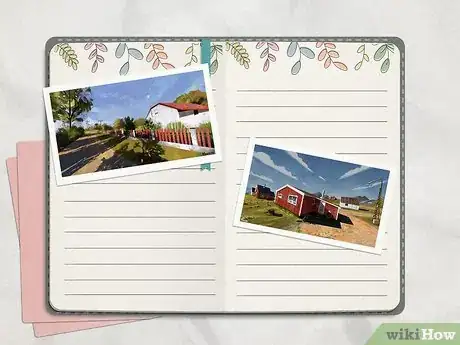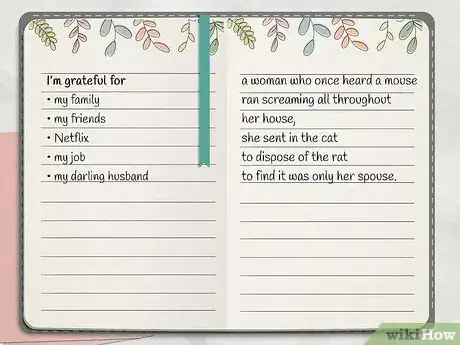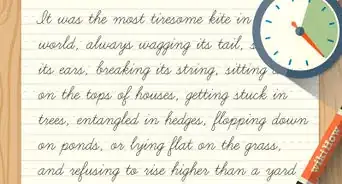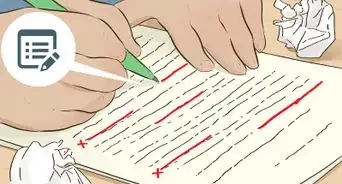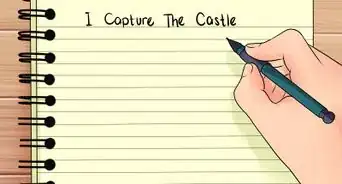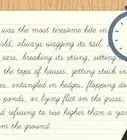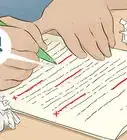wikiHow is a “wiki,” similar to Wikipedia, which means that many of our articles are co-written by multiple authors. To create this article, 9 people, some anonymous, worked to edit and improve it over time.
wikiHow marks an article as reader-approved once it receives enough positive feedback. In this case, 93% of readers who voted found the article helpful, earning it our reader-approved status.
This article has been viewed 54,502 times.
Learn more...
Turning writing into a hobby takes determination. It may not seem so, but making time to write, finding things to write about and then remaining dedicated to seeing the entire piece through to its endpoint requires planning and self-discipline. Nevertheless, it's a great hobby to have and definitely worthwhile if you're keen to turn it into a favorite hobby.
Steps
Figuring Out Your Stationery Needs
-
1Find suitable ways to record your writing. Some people prefer writing with pen and paper, such as in a notebook. Some prefer typing into a word processor such as a computer, iPad or laptop. Many people like to combine both approaches, as this allows for different modes of thinking, working, sitting, relaxing, and so forth. Try each and then combine them to find your favorite approach.[1]
- You could even try typing on an old typewriter if you'd like. Old typewriters can be found through online trade and auction sites. However, keep in mind if you choose this method that you'll also need a supply of typing ribbon and/or ink.
-
2Decorate your notebooks. If you're using notebooks, decorating them can help to keep you inspired. This can be as simple as sticking a favorite logo or sticker on the front or as elaborate as adding scrapbook cut-outs, fabric collage or decoupage. The decorations are completely up to you, as long as the notebook has an interesting look to it that'll inspire you to pick it up and write in it.
Finding Writing Inspiration
-
1Jot down ideas. This is the first good habit to get into. Write down things you think you'd like to write about as you come across them. While many of these ideas may amount to nothing, some may turn into your next poem, news article, great American novel, or other writing piece. If you don't note down these ideas as they occur to you, you'll be likely to forget them.[2]
- Consider carrying a small notebook and pen or having a note-taking app on your smartphone. Having at least one of these with you wherever you go will help you record those ideas as they come to you.
-
2Use photographs as inspiration. These may be ones you've taken or that you've found. Photographs can be another source of inspiration for inspiring your writing. For example, perhaps you have seen an amazing photo of a place taken by a friend and uploaded to social media. The photo captivates you and carries you away to another time and land, and words about this experience begin to form in your mind. That's a great form of inspiration!
- Consider keeping a Pinterest or similar account filled with your favorite images as you find them. Keep the board secret if you don't want to share your writing inspiration.
-
3Listen to other people. Take note of what inspires other people, what they like to read and learn about and what's current both now and in the past. All of these tidbits can feed into inspiring your writing.
-
4Write lists, paragraphs and poems. These are all practice prompts. Once you have chosen the best ideas from these, you will probably feel ready to start the writing process for a more elaborate piece.[3]
Writing as a Hobby
-
1Decide what sort of writing you're keen to do. There are a vast array of writing activities possible, including book summaries, book critiques, blog posts, short stories, poems, novels, non-fiction, journal entries, commentaries, essays, website reviews, and so on. You might like to try a few different ones to find which niche you're most comfortable in. Also, since writing novels or non-fiction can take a long time, mixing in some other styles of writing can help to keep you interested in writing as a hobby.[4]
-
2Make time to write. Just as with any hobby, you'll need to set aside time to indulge in it. Write regularly so that you stay in the swing of it. The longer your breaks are, the less likely it is that you'll feel like returning to a piece of writing. Small breaks are good, but don't stretch them out for too long.
- Set aside time-slots during your week just for writing. Keep these times as much as possible, seeing them as important for your hobby.
-
3Write somewhere you feel comfortable. Though some may not want others around them, it's entirely up to you whether you are okay with people around you when you're writing. If you wish to hole yourself up in the attic or gazebo, that's fine, as is sitting in a café and penning your piece amid the hubbub of others chatting away. Choose whatever works best for you, noting that this may change over time or even back and forth over days and weeks.[5]
Community Q&A
-
QuestionI want to write a diary but nothing interesting goes on in my life and I want to make it interesting. What can I do?
 Community AnswerTry going on an adventure or try new things. Your diary is really only for you. Write down your hopes and dreams, frustrations and fears, and don't worry about if it's interesting or not.
Community AnswerTry going on an adventure or try new things. Your diary is really only for you. Write down your hopes and dreams, frustrations and fears, and don't worry about if it's interesting or not. -
QuestionI want to start writing but it seems that I am always out of ideas about what to write, how to write and so on. How do I solve that?
 Community AnswerWriter's block is a part of writing, and it's okay to be uninspired. To combat this, you can look up writing prompts to try and inspire yourself. If you're really out of ideas, just write something random. Just get something down on paper and write about anything. It will help.
Community AnswerWriter's block is a part of writing, and it's okay to be uninspired. To combat this, you can look up writing prompts to try and inspire yourself. If you're really out of ideas, just write something random. Just get something down on paper and write about anything. It will help.
References
- ↑ https://www.theguardian.com/books/2011/nov/03/creative-writing-better-pen-longhand
- ↑ https://www.huffpost.com/entry/8-steps-to-starting-a-wri_b_4724235
- ↑ https://medium.com/every-30-days/how-to-develop-a-daily-writing-habit-475732c2b026
- ↑ https://writingcooperative.com/how-to-just-write-c1e613f48171
- ↑ https://writingcooperative.com/how-to-just-write-c1e613f48171

